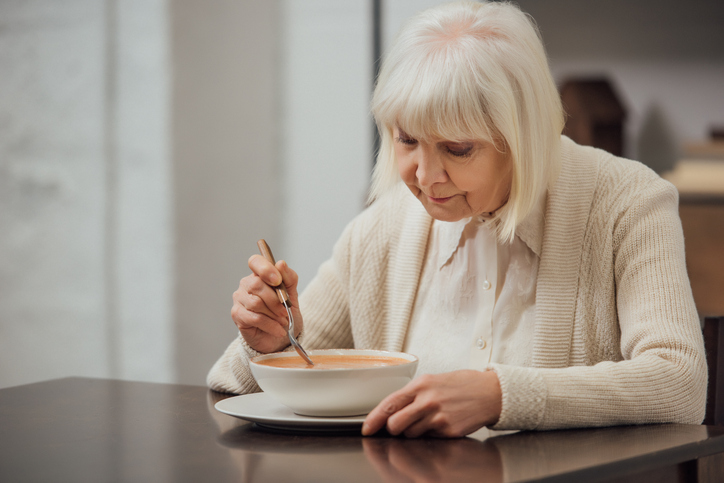
It can be hard to know what to do about senior appetite loss, but these tips can help.
You have just made a huge batch of Mom’s legendary chili recipe. Your house smells yummy, and you can’t wait to enjoy a bowl. However, while you are savoring not only the taste but the memories the meal conjures, Mom is just stirring the food around in her bowl. And it’s not the first time. Lately you’ve noticed a decreased interest in food, and you’ve been wondering what to do about senior appetite loss and if it’s a cause for concern.
Why Would an Older Adult Lose Their Appetite?
Loss of appetite is actually very common for many aging adults, for a variety of reasons, including:
- Difficulty with preparing meals
- A sedentary lifestyle
- Dehydration
- Feeling as though they’ve lost control over other aspects of life
- Depression and/or grief
- Loss of taste or smell that makes food less appealing
- Problems with chewing, swallowing, or self-feeding
- A routine that doesn’t include regular mealtimes
- Loneliness and having no one to share meals with
It’s essential to first talk to the person’s health care provider and dentist to rule out any health issues or medication side effects that may be causing the problem. When it’s determined that there isn’t a clinical reason behind the change in appetite, try these suggestions to help restore the person’s joy in eating.
- Provide high-calorie foods in small quantities. Rather than three large meals each day, try smaller portions more frequently. You can still make larger amounts of favorite meals, splitting them up into individual helpings which can be frozen and reheated. Other foods to try that will offer important nutrients include cheese, peanut butter or other nut butters, finely chopped eggs or meat, avocado, yogurt, diced fruit, and whole milk.
- Incorporate softer options. During the summer when fresh fruit is especially tasty, try blending up some healthy smoothies. Summer is also a great time for frozen yogurt, milk shakes, and ice cream. Make it more fun and festive by inviting your family over to make their own custom treats and enjoying them outdoors together.
- Create a schedule. Instead of waiting until the person says they are hungry, set designated times every day and stick to a routine for eating. It could take some trial and error to find the best schedule, but give the new routine some time to work before adjusting. Ensure that the individual’s routine includes plenty of physical activity and exercise as well, which helps to boost appetite.
- Adapt foods and utensils accordingly. If self-feeding is difficult, there are a variety of adaptive utensils to explore. You can also make mealtimes easier by serving food that is cut into small, bite-size portions, as well as finger foods including sandwiches, fish sticks, string cheese, chicken tenders, etc.
Hearts at Home In-Home Care’s experts in home care services, are here to help older adults overcome obstacles to eating healthy. We can prepare nutritious meals and snacks, provide inspiration to stay physically active, and offer friendly companionship during mealtime to make it more fulfilling. Get in touch with us online or give us a call at 913-440-4209 to learn more about how we can help a person you love in Overland Park, Lenexa, Kansas City and nearby communities.
